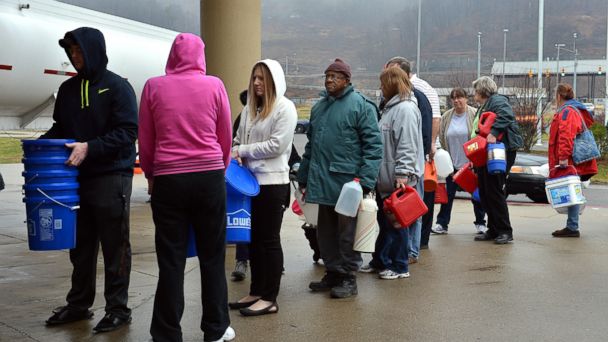West Virginia Sen. Rockefeller Won't OK Charleston Water a Month After Spill

(Credit: Craig Cunningham/The Daily Mail/AP Photo)
WASHINGTON - Sen. Jay Rockefeller doesn't believe the tap water for 300,000 in West Virginia is safe to use a month after a massive chemical spill in his state put it at risk. And with ongoing uncertainty over the water supply in Kanawha Valley, the lawmaker says he won't trust investigators' assurances, given the state's history of "lack of regulatory control."
"No, I don't, and even if some expert group told me it was safe I don't think I'd believe it," he told ABC affiliate station WCHS-TV Friday, adding "They can say it's not hazardous or this or that, but it doesn't mean anything."
The West Virginia Department of Environmental Protection and federal Centers for Disease Control and Prevention have asserted that levels of the chemical 4-methylcyclohexane methanol, or MCHM, are at acceptable or non-detectable levels in the affected counties. But the Democrat says 50 years of public service in the state, which is known for its relationship with energy industries, has left him skeptical.
"It just gets into the degree of control that corporations have over people," he said. "They dominate in West Virginia's life. Governors get elected - and I was a governor once - and they appoint people to regulatory jobs who helped them in campaigns. What does that tell you?"
On Jan. 9, Freedom Industries reported its chemical processing plant in Charleston had leaked up to 5,000 gallons of MCHM, used in coal processing, into the Elk River. The company later upped that number to 10,000 gallons and announced two weeks later that a smaller amount of a second chemical, a mixture of propylene glycol phenyl ether, or PPH, and dipropylene glycol phenyl ether had escaped from the same tank.
Rockefeller said the fact that the containers at the facility had not been inspected since 1991 was "absolutely astounding."
Rockefeller along with fellow West Virginia Sen. Joe Manchin and Senate Environmental Committee chair Barbara Boxer have authored legislation to strengthen inspections of above-ground chemical containers such as the Freedom Industries plant, and to require industries to develop state-approved disaster response plans. The three Democrats' bill is undergoing committee review.
Few health studies have been done regarding the substances, and while the water ban has been lifted, the CDC has suggested - "out of an abundance of caution" - that pregnant women avoid consuming the water.
Residents have reported symptoms including nausea and rashes, although health officials stress they have not found a direct link to the chemical. Meanwhile, a lingering "licorice" smell, the tell-tale sign of the contaminant, persists in some faucets and forced the temporary closure of some elementary schools this week. Some free water distribution centers have remained open in the valley.
Rockefeller told the station some constituents have told him they may leave the area altogether.
"They're mostly people with very young babies," he said. "They look to a future of this kind of lack of regulatory control and discipline and they say, 'Where I live is less important than my children grow up healthy.'"
The sentiment matches discussions ABC News has had with some West Virginians in the weeks since the spill.
But life in Kanawha Valley has slowly come back to normal for most residents. Restaurants are open, the business district of state capital Charleston is back in operation, and the water distribution centers are quietly shutting down.
"With all the scientific evidence we have, with everything that numerous people have worked on so far I can say that you can use your water however you like," Dr. Tanja Popovic of the CDC said in a Wednesday news conference. "You can drink it, you can bath in it, you can use it how you like."
Regardless, Kanawha County's top public health official, Dr. Rahul Gupta, remains an outspoken critic of the dismissal of the water crisis. In an interview with ABC News Thursday, the executive director of the Kanawha-Charleston Health Department said the long-term effects of MCHM are yet to be known.
"The symptoms that may develop on exposure in the short run may not necessarily be tied to the long-term impact of the exposure of this chemical," he said. "So to me it is very important that we take a serious look at working to find out what the long-term impact of this chemical is. I think it would be a mistake to dismiss the long term impact of this chemical without knowing the realities."
Gupta says that even if the water is ultimately safe to drink, some people may still be susceptible to the odor.
"Water is not supposed to have that smell. That's one of those conditioned responses from us as humans that it's not something we're used to smelling," he said. "As long as it smells, people have a feeling that, 'it's in my water' and as long as it's in the water people are having a difficult time drinking the fluid such as water that is smelling, myself included."
Freedom Industries has filed for bankruptcy and is the subject of a criminal investigation.